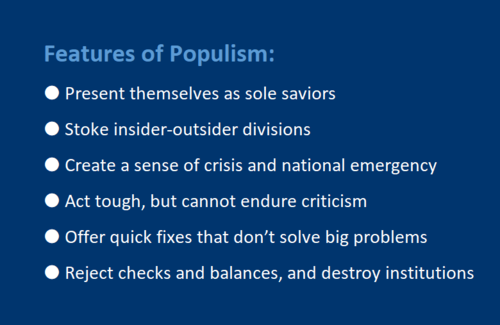Myth of Unified World Populism: Financial Times
The world has many populists in power in prominent nations – the US, India, the UK, Brazil, Turkey and the Philippines, to name a few – raising fears of global movement as envisioned by Steve Bannon, a former advisor to Donald Trump. Janan Ganesh expresses doubt that the populists have such capability. Populists thrive on enemies. Once in power, they struggle to take responsibility. Most simply do not work well with others for long and fail to deliver substantive policies that satisfy majorities. “What its adherents have in numbers and geographic spread, they lack in cohesion,” he writes for the Financial Times. “And of all their differences, the deepest is between the US and the rest. It should not need saying that what Mr Trump jeers as ‘globalism,’ much of the world thinks of as Americanism.” Populists share a penchant for rejecting tradition, and Trump has set an example for self-interested competition with America-first policies. Europe and Asia each are fiercely proud of their values and traditions, and few nations will accept US influence from populists who do not respect standing and opinions of others. Ganesh anticipates more quarrels among the populists and concludes they lack the skills, temperament and support to construct a new world order. – YaleGlobal
Myth of Unified World Populism: Financial Times
Global populism movement is unlikely: Populists offer exciting quick fixes, but struggle to cooperate or develop policies that satisfy majorities for long
Thursday, September 12, 2019
Read the article from Financial Times, suggesting that a global populism movement is unlikely.
Janan Ganesh is a biweekly columnist and associate editor for the FT. He writes on American politics for the FT and culture for FT Weekend.

(Source: Jordan Kyle, “Populists in Power Around the World,” Tony Blair Institute for Global Change)
Financial Times
Copyright The Financial Times Limited 2019. All rights reserved.